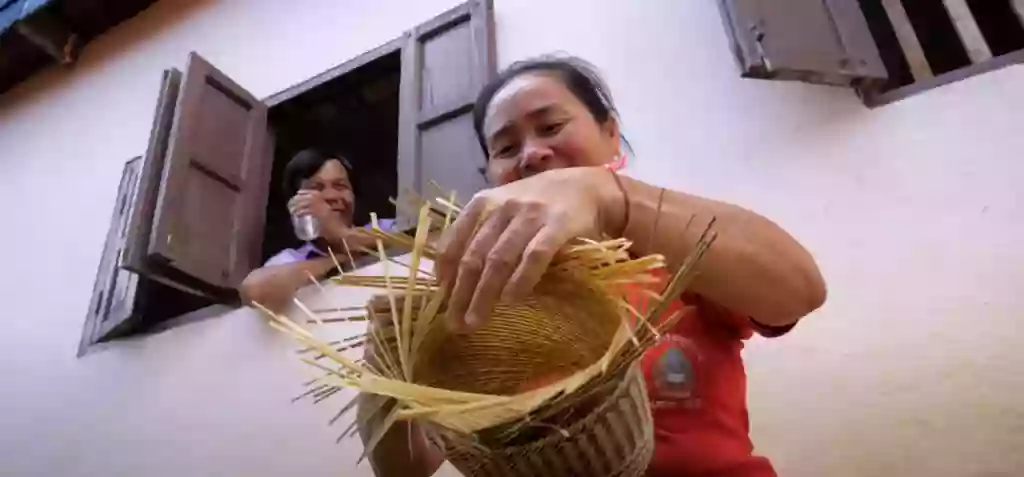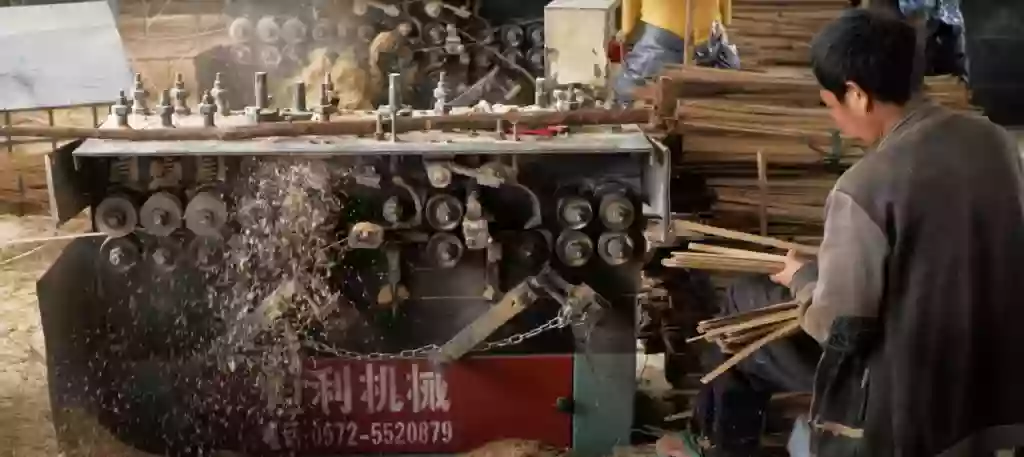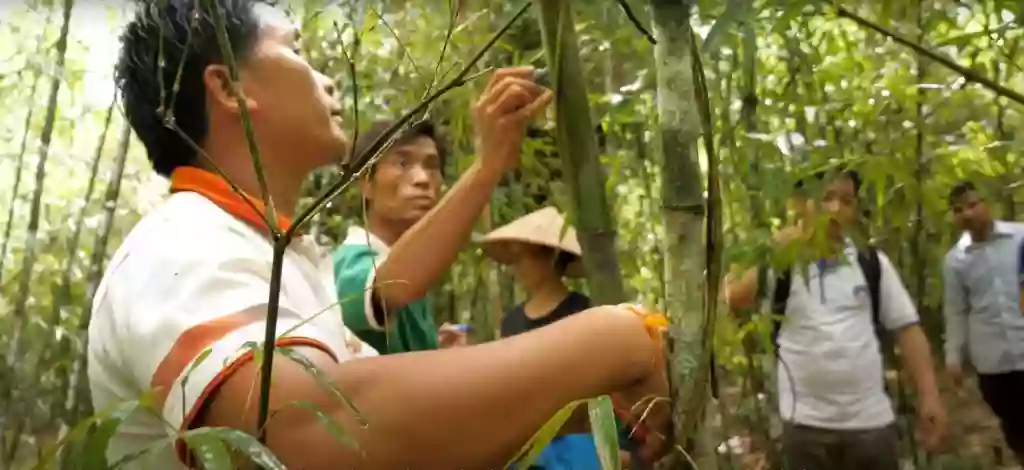Since 2009, GRET has been supporting the emergence of shared governance of village bamboo forests in Houaphan province in Laos, taking a commons-based approach. In 2024, a new phase was launched to extend this promising dynamic to new villages by 2027.
Houaphan province, one of the poorest regions in Laos, has more than 526,000 hectares of natural bamboo forests. Its inhabitants, mostly animist ethnic minorities (including Hmong, Khmu and Tai Deng) make their livelihoods from shifting cultivation and collecting non-timber forest products for food and additional income. Bamboo is a vital resource for these communities, especially for women and young people. Used for cooking (bamboo shoots) and domestic needs, it also provides a large part of families’ income, allowing them to pay for children’s education, housing, and connection to a drinking water or electricity network. Bamboo is also an essential natural capital enabling the continuity of forest cover thanks to its rapid growth and soil improvement properties.
At the beginning of the 2000s, the expansion of monoculture (such as maize) and industrial activities, threatened these forests, while exposing villagers to competition from foreign investors
GRET began providing support to this province in 2009. The unexploited potential of this “green gold” and the strong motivation of rural communities were highly promising elements. The objective was to minimise over-exploitation of bamboo resources and strengthen recognition of villagers’ rights and capacities in their forests.
A commons-based approach to take care of bamboo forests
In this case, the commons-based approach combines an approach based on the territory (the bamboo forest) and on value chains. This provides a means to ensure better participation and empowerment of local populations in decisions on their village forests. The idea is to think about the role local stakeholders can play in dealing with social and ecological threats. For GRET, the commons correspond to a social dynamic, in which a group of individuals becomes organised to collectively take care of common goods on which they depend (in this case the bamboo forests). This is achieved by building hared governance, involving local populations, together with private and public stakeholders.

GRET’s approach was to involve all stakeholders directly concerned by the resource in a collective dynamic: villagers, traders, retailers and public authorities. More than 80 villages of the province became involved in this dynamic.
GRET supported five sustainable bamboo value chains based on diversity of species. Each value chain has its own seasonal calendar, market and production organisation.
A sustainable village monitoring system was set up, preserving almost 6,000 hectares of natural bamboo forests. As a result, forest management and monitoring techniques (harvesting, planting…) were identified and disseminated, enabling commercialisation of bamboo while maintaining the forest cover and ensuring its regeneration.
To ensure the sustainability of the dynamic undertaken by the stakeholders, GRET supported the emergence of a local association called the Bamboo and Non-Timber Forest Product Development Association – BNDA , which took over the role of technical support and facilitator of dialogue between the villagers, traders and authorities. It is the first civil society organisation that was set up in this province, in 2021.
In parallel, GRET advocated for greater recognition of villagers’ role in shared governance of bamboo forests and in the related public policies. For example, a 2016-2020 provincial strategy to develop the bamboo value chain was adopted in Houaphan.
GRET also supported the creation of a national multi-stakeholder platform, to contribute to the creation of a bamboo strategy at national level, with a dual objective: to fight against poverty and ensure sustainable management of natural resources.
“Before the Bamboo programme started in our village in 2012, we had no rules to ensure the forest was exploited sustainably. Today, we have rules for ourselves and for people from outside, and we study the forest every year to ensure it regenerates. In addition, with the sale of bamboo we earn more than eight million kips per year. This money is used as working capital for the village members.” Seu Her, head of the Ban Houaymeuang bamboo producers’ group.
Since 2022, the provincial dynamic has been facilitated by the BNDA, with a specific focus on involving ethnic minorities and women.

From 2024 to 2027, GRET and BNDA are extending the dynamic to 21 villages in Houaphan, while strengthening the programme’s achievement in 50 villages. Focusing on women and young people from ethnic minorities, this new project aims to improve the livelihoods of rural communities by unlocking the economic and environmental potential of bamboo. The project targets three core objectives: boosting income, protecting forests, and strengthening policy support:
The project supports over 20,000 villagers, many of whom are poor and landless, to earn additional income from sustainable bamboo-related work. The objective is to reach an additional income of about $250 per year, a 25% increase for some families. Villagers receive hands-on training in product quality, pricing, and marketing, helping them participate more effectively in local markets. Special attention is given to women and youth, who are trained to take leadership roles in bamboo production and forest management. In 21 new villages, the project identifies and supports promising bamboo-based livelihood activities, while in 50 other villages, successful practices are shared and scaled up through peer learning and training sessions.
The project also works to protect more than 6,000 hectares of bamboo forest from harmful practices, like slash-and-burn farming and overharvesting. Villagers are trained in sustainable harvesting techniques and supported to develop and implement forest management plans. A monitoring system is introduced in each village, ensuring that local forest use is transparent, effective, and benefits the community. These efforts empower villagers to take part in decisions that affect their environment and livelihoods. Community data is collected and shared through annual reviews, to drive ongoing improvements and collective learning.
To ensure long-term success, the project helps strengthen the role of BNDA as a national leader in community-based bamboo development. BNDA is being equipped with the tools and skills needed to influence national policy and support grassroots action, even after the project ends. At the same time, the project works closely with government officials to update the provincial bamboo strategy and support the development of national policies and funding mechanisms that recognise the value of bamboo for both income generation and forest conservation.
By blending local empowerment with environmental stewardship and policy engagement, the project is creating a model for sustainable rural development that can be scaled across Laos.

This long term social dynamic facilitated by GRET and BNDA has been supported by several financial partners since 2010, including Agence française de développement, the Swiss Agency for Development and Cooperation, the Ensemble Foundation, and Oxfam.
Learn more
